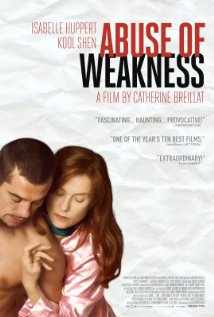
THE ABUSE OF WEAKNESS/ L’ABUSE DE FAIBLESSE
France, 2013, 105 minutes, Colour.
Isabelle Huppert, Kool Shen, Laurence Ursino.
Directed by Catherine Breillat.
Catherine Breillat has made provocative films for several decades, many of them having difficulties with censorship boards because of their explicit nudity and sexual activity. In more recent years, she has turned to a greater interest in drama rather than explicit presentation. This is especially the case with this film.
Isabelle Huppert must be one of the greatest actresses of the time, less well known and recognised than Meryl Streep because she works on the continent, although she has appeared in a number of American films. The opening sequences where she has a stroke, lies in hospital deformed, has to go through rigorous physiotherapy, reminds audiences how talented she is.
She plays a film director. During her convalescence she sees an interview on television with a conman who spent 12 years in prison in Hong Kong for fraud, has written a book, comes across quite charmingly. She contacts him and, although he is not an actor, invites him to participate in her forthcoming film. He visits her, they discuss the project, he likes the ending and so agrees. He still keeps up his business interests as well as gambling. He is also married.
The conman moves in with the director, a platonic relationship, more a mutual exercise of power and influence with the focus on money. She is beguiled by him, signing many cheques, he gambling, continuing to call on her, especially after moving in with her. At the end, her bewildered accountants and family members cannot understand her behaviour – and there is a most telling scene at the end where she explains that what she did was really her – but also was not her, explanation and justification which mystifies the relatives and mystifies herself.
1. An interesting portrait of a woman, illness, the stroke, the attraction to the conman, her being deceived, the final explanation, justification?
2. The themes of Catherine Breillat? Exploring the boundaries of human interactions? This film as much more restrained than usual?
3. The presence of Isabelle Huppert, her strong career, ability to immerse herself in a character?
4. The opening, Maud, in bed, her pain, the experience of the stroke, trying to get out of bed, the difficulties in
phoning, the information, the body feeling dead? In hospital, the treatment, the family visiting? Her face being deformed, difficulties with her mouth and lips? Her arm crooked?
5. The cumulative effect of the scenes of physiotherapy: on the ball, moving her lips, her mouth, the wheelchair, walking, her stick?
6. Her watching television, the interview with Vilko, his explanation, his crimes, imprisonment in Hong Kong, the conman, dealing with millions? Attraction, her communicating with him, invitation to the film, his reactions, coming to see her, elaborating the plot, his being interested in the ending? His agreement?
7. Maud as a film director, her career, her assistant, discussions with him, his advice? The photographer? The characters, collaboration with Maud?
8. Vilko, his background, his marriage, the scenes with his wife? His moving in? His activities, gambling, her signing the cheques, the cumulative effect? The range of discussions with him, his coming while she was auditioning the child actor? The full amount, the squabbles? His losing his wife?
9. The effect on Maud, an obsession, dependence, losing money, the discussions about payment, her searching his clothes for money?
10. The final clash, breakup, her losing all her money?
11. The discussions with accountants, with family members, the disbelief, explaining what she did, signing the cheques – and the repetition that it was her, that it was not her?